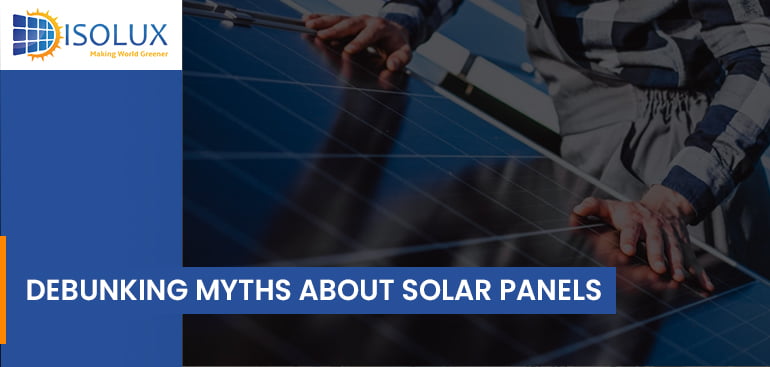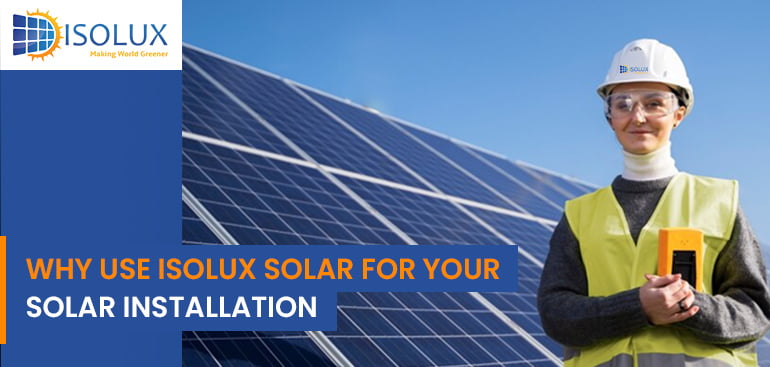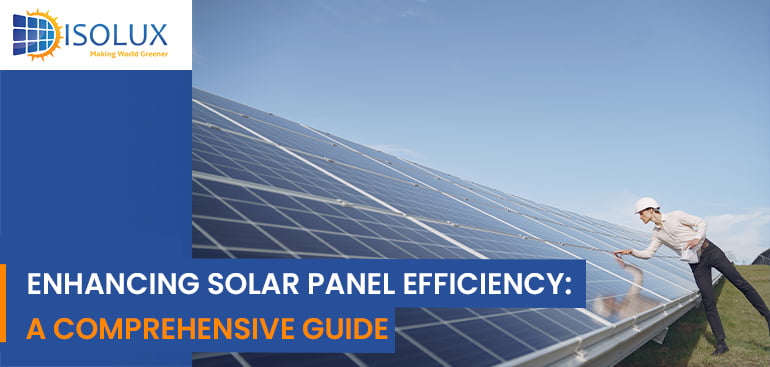Solar power has been increasingly gaining attention and popularity as a source of renewable energy, and for good reasons. It is clean, and efficient, and can save you money on your energy bills in the long run. However, there are many myths and misconceptions surrounding solar power and solar panels that prevent some people from fully embracing this technology. In this blog, we will debunk some of the most common myths about solar power and solar panels.
Myth 1: Solar panels are Too Expensive
One of the most common myths about solar panels is that they are too expensive to install and maintain. While it is true that solar panels can be a significant upfront investment, the cost has significantly decreased over the years. Moreover, the long-term benefits of solar panels can save you money on your energy bills, which can offset the initial cost.
Myth 2: Solar Panel Doesn’t Work in Cloudy Weather
Another common misconception about solar panels is that they don’t work in cold or cloudy weather. While it is true that solar panels work best in direct sunlight, they can still generate electricity even on cloudy days. Additionally, solar panels are designed to work in various weather conditions, including cold and snowy weather.
Myth 3: Solar Panels Require a Lot of Maintenance
Contrary to popular belief, solar panels don’t require much maintenance. The panels are made of durable materials and are designed to withstand various weather conditions. Generally, cleaning the panels a few times a year is enough to keep them functioning at optimal levels.
Myth 4: Solar Panels are Not Efficient Enough to Power your Home
Another myth about solar panels is that they are not efficient enough to power a home. However, with the advancements in solar technology, modern solar panels are much more efficient than older models. A well-designed solar panel system can generate enough electricity to power your home and even produce excess energy that can be sold back to the grid.
Myth 5: Solar Panels Will Damage/Ruin Your Roof
Some people believe that solar panels will damage their roofs, but this is not true. Solar panels are installed using non-penetrating mounting systems, which means that they are not bolted directly onto your roof. Moreover, the installation process is carried out by professionals who take precautions to prevent any damage to your roof.
Myth 6: Solar Energy is Only for Wealthy People
While solar panels were initially more expensive, the cost has decreased significantly over the years, making solar energy more accessible to everyone. Additionally, there are various financing options and incentives available to help make solar energy affordable for all households.
Myth 7: Solar Panels will Cause Power Outages
Some people believe that solar panels will cause power outages, but this is not true. Solar panels are designed to work alongside the grid, and the excess energy produced by solar panels is fed back into the grid. Some solar panel systems have battery backups that can power your home during power outages. This means that solar panels can help to prevent power outages by reducing the demand for electricity from the grid.
Myth 8: Solar Panels are Not Aesthetically Pleasing
This myth is quickly becoming outdated as solar technology continues to evolve. In the past, solar panels were large and bulky, and they were often installed in highly visible locations, like rooftops. However, modern solar panels are much sleeker and more stylish than their predecessors, and they can be designed to match the look and feel of your home or business. Some solar panel companies offer panels that are designed to look like traditional roofing materials, such as tiles or shingles. This means that solar panels can enhance the aesthetic appeal of your property, while also providing you with clean, renewable energy.
Myth 9: Solar Panels are Not Durable and will Need To Be Replaced Frequently
This is a common misconception about solar panels, but it is simply not true. Most solar panel manufacturers offer warranties that guarantee the panels will produce energy at a certain rate for up to 25 years, and many panels continue to produce energy even after the warranty has expired. Additionally, solar panels have no moving parts, which means that they are less likely to break down or require repairs than other types of electrical equipment. As long as the panels are installed correctly and maintained properly, they can provide reliable and efficient energy for many years to come.
Myth 10: Solar panels will Provide Energy During a Blackout
Solar panels alone may not provide you with blackout power. While solar panels generate electricity from sunlight, they typically require a battery storage system to provide power during a blackout. Without a battery, solar panels will not function during a blackout because they rely on a connection to the electrical grid to operate. However, with the addition of a battery storage system or backup generator, solar panels can provide reliable power during a blackout.
Myth 11: Don’t Use Much Power During the Day, are Solar Panels Worth It
If you don’t use much power during the day, solar panels may still be worth it for you if you have a net metering arrangement with your utility company. Net metering allows you to send excess electricity generated by your solar panels back to the grid and receive credits on your electricity bill. Then, when you need power at night or on cloudy days, you can use those credits to offset the cost of electricity from the grid.
Additionally, installing solar panels may increase the value of your home and can help you reduce your carbon footprint. So, even if you don’t use much power during the day, it’s worth considering whether solar panels are a good investment for your circumstances.
Conclusion
Solar power and solar panels are reliable and efficient sources of renewable energy that can help to reduce our dependence on fossil fuels and combat climate change. While some myths about solar panels, it is important to separate fact from fiction to make informed decisions about energy consumption and production. By understanding the truth about solar power and solar panels, we can work to harness this valuable resource and create a more sustainable future for ourselves and for generations to come.
Get a free quote from Isolux solar for solar panel system installation in Sydney.
FAQs
Here are some frequently asked questions about solar power and solar panels:
The amount of energy produced by solar panels depends on a variety of factors, including the size and efficiency of the panels, the amount of sunlight they receive, and the geographic location of the panels. On average, a 5-kilowatt solar panel system can generate about 7,000 to 8,000 kilowatt-hours of electricity per year.
Excess energy produced by solar panels is typically fed back into the grid and can be credited toward your energy bill. Some solar panel systems also have battery backups that can store excess energy for later use.
The cost of solar panels varies depending on a variety of factors, including the size and efficiency of the panels, the complexity of the installation, and the geographic location of the panels. However, the cost of solar panels has decreased significantly in recent years, making them a more affordable option for many homeowners and businesses.
Yes, there are often tax incentives and rebates available for installing solar panels. These incentives vary by state and country, so it is important to research the available incentives in your area.
Yes, solar panels are a clean and renewable source of energy that does not produce harmful emissions of pollutants. By using solar power, we can reduce our dependence on fossil fuels and help to combat climate change.




